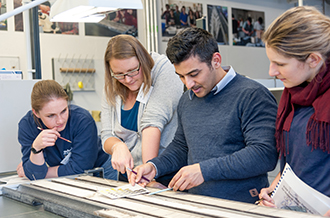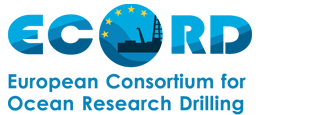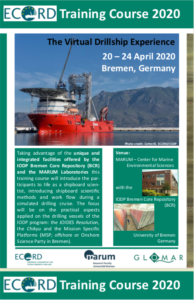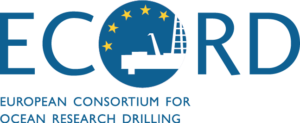ECORD Training Course 2020
20 – 24 April 2020, at the MARUM – Center for Marine Environmental Sciences and the IODP Bremen Core Repository (BCR), University of Bremen, Germany
Cancelled due to Covid-19 situation
The Training Course
As host of one of the three IODP core repositories in the world, the MARUM in Bremen is an important hub for marine geoscientists. Taking advantage of this setting, the ECORD Training Course provides a “Virtual Drillship Experience” for scientists from academia and industry. This one-week course offers a basic training focusing on IODP core-flow procedures, preparing the participants for sailing in an offshore drillship expedition, and instilling them with an appreciation for high standards in all kinds of coring projects. IODP-style lab exercises form the foundation of the ECORD Training Course following the pattern of the unique “Virtual Ship” approach.
The training course focuses on:
- Introduction to IODP and ECORD
- Virtual shipboard work at BCR/MARUM:
Physical properties – core logging, Sediment visual core description and smear slide analysis, High-resolution linescan imaging and color scanning, Biostratigraphy, Pore-water acquisition and analysis, Hard-rock core description. - Introductory seminars to general shipboard activities:
Core splicing and time-series analysis, Downhole-logging integration, Data management. - Interactive session on defining drilling targets and strategies including drilling proposal writing.
Who can apply to participate?
Early-career and established scientists from academia and industry from all over the world who have an interest in scientific drilling and development of professonial skills in core analysis.
Course fees
The course fees depend on the career level, the country the participants are affiliated to, namely its respective role in ECORD and IODP, and the sector (academia vs. industry).
For more information about fees, programme and how to apply, visit the web page.
 Past Training Courses
Past Training Courses
25-29 March 2019: 29 participants from 10 countries
23-28 April 2018: 31 participants from 14 countries
6-10 March 2017: 30 participants from 11 countries
7-11 March 2016: 30 participants from 14 countries – Report
9-13 March 2015: 30 participants from 9 countries – Report


